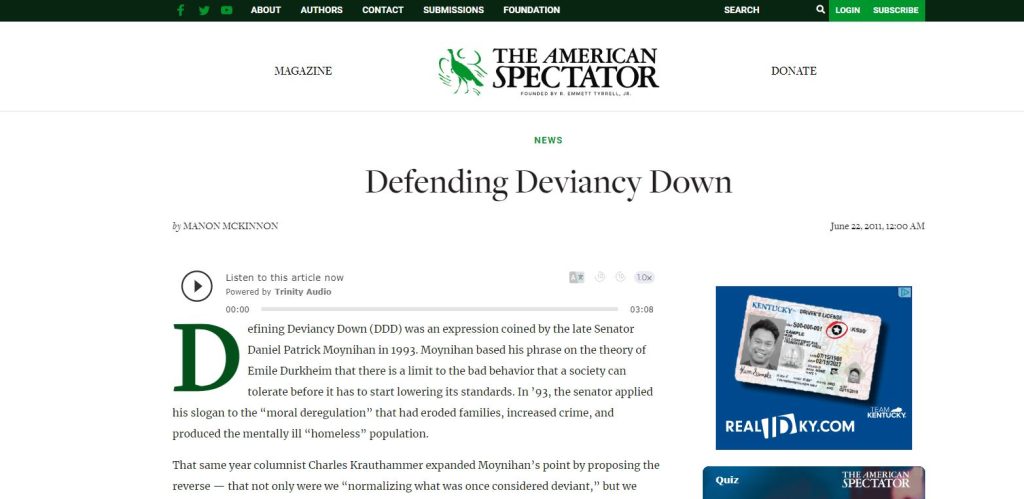“Defending Deviancy Down”

“At a time when statesmanship is hard to find, we thought it best to link to two important pieces by the beloved, far-seeing late Senator Daniel Patrick Moynihan. He was a Democrat who reached across the aisle and who did what he thought was right rather than what was popular. His concerns about divisiveness in America were prescient.” – The DailyClout Editorial Team
Originally published on The American Spectator
Defining Deviancy Down (DDD) was an expression coined by the late Senator Daniel Patrick Moynihan in 1993. Moynihan based his phrase on the theory of Emile Durkheim that there is a limit to the bad behavior that a society can tolerate before it has to start lowering its standards. In ’93, the senator applied his slogan to the “moral deregulation” that had eroded families, increased crime, and produced the mentally ill “homeless” population.
That same year columnist Charles Krauthammer expanded Moynihan’s point by proposing the reverse — that not only were we “normalizing what was once considered deviant,” but we were also “finding deviant what was once considered normal.” (Think date rape, political correctness and politically incorrect speech.) In time, the inevitable lower standards and moral relativism brought us the movies, TV shows, fashions, sex norms and web pages we have today. Deviant and normal swapped places.
A sad example of this rearrangement was seen in the early reaction to the behavior of Congressman Anthony Weiner — that unfortunate New York congressman whose story came to an end last week when he resigned. But while he was trying to hang on — and in spite of having forsaken his marriage vows, all personal discipline, responsibility to his office, and telling big lies to everyone — 56% of his constituents thought he should not resign from Congress and 51% of New Yorkers agreed! Majorities that became the 2011 champions of Defining Deviancy Down.
And they were not alone. Washington Post reporter Dana Milbank was quick to opine, “we’d be better off if lawmakers gambled more with their private parts and less with the public good.” His colleague Richard Cohen agreed: “We are doing a terrible thing here — we hypocrites of the press, especially of the blogosphere. Every man lives a bit in a fantasy world, maybe women, too, but I know nothing of them. Every man is a boy, either in mind or in deed. Much of this is harmless. There are no bodies. There is no crime. This is the case with Weiner. No damsel was in distress, and no one was rescued.” But for writer Cohen it seemed not to be enough to simply illustrate Moynihan’s point, he then went on to the Krauthammer corollary when he saw the real deviance in the exposure of and attention to the matter. “Another Christian has been thrown to the lions. The Christian in this case is a Jew.”
Meanwhile, many saw Weiner’s power undiminished. Blogger and columnist Ezra Klein was one of those: “It’s not at all obvious to me that Weiner’s future effectiveness has been so impaired that he has no choice save to resign.” New York Congressman Charles Rangel (no stranger to ethics problems himself) joined the chorus saying, “Of course [Weiner] can be effective. He’s smart and he’s respected.” Deviancy down, for sure.
Finally, the congressman hit the point of no return and lost his defenders. But Weinergate had by then illustrated how low a public figure could go before what was left of our standards kicked in. Alas, Moynihan and Krauthammer had it right.
One of our country’s most important freedoms is that of free speech.
Agree with this essay? Disagree? Join the debate by writing to DailyClout HERE.



